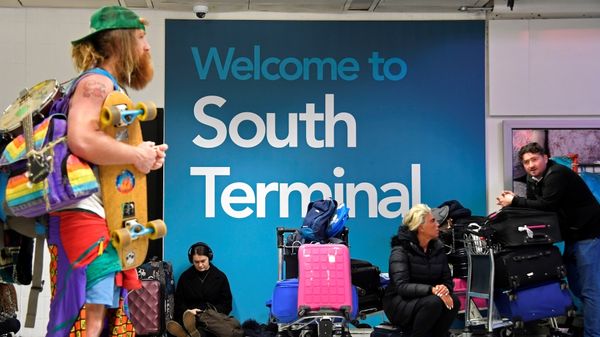
This article is an instalment in a new series, Punted, on the government’s failure to reform gambling advertising.
According to the Australian Institute of Health and Welfare, in 2022 around three-quarters of Australians had gambled in the previous 12 months and just under 40% gambled at least weekly. It’s a predominantly male habit: 80% of men compared to two-thirds of women had gambled in the previous year, more than twice as many men had engaged in sports gambling compared to women, and the number of men who gambled on animal racing was around 70% higher than women.
Those aren’t the most frequent forms of gambling — nor are poker machines (40% of men and 28% of women had played them in the past year). Lotteries and scratchies were by far the most common forms of gambling in Australia (70% of men, 59% of women). Part of that is presumably the widespread use of scratchies as gifts; no Christmas is complete without some distant relative gifting one a small card that requires a coin — once a plentiful object, now vanishingly rare — to unmask that one may have won $10.
The scratchie is the purest, most disposable form of gambling. Unlike sports gambling, where punters believe they can influence their chances of success with detailed knowledge of the contest — that is, corporations have monetised people’s passion for a sporting endeavour — and unlike poker machines, where one must physically visit a venue to lose money, a scratchie is simple: it’s pure luck, reduced to a form small enough and portable enough to fit inside a Christmas card.
Buying a scratchie or a lottery ticket is, primarily, buying a personal service. The consumer is purchasing the experience of having, for a few moments at least, a hope of a material improvement in their life, however remote. Gambling offers the hope of a cheat code for modern capitalism: instead of slaving away at a pointless, precarious job to pay off first your education debts, then your housing debt (if you’re lucky enough to have one), and then the cost of raising children to do the same thing as you, you can buy a chance to escape that Sisyphean ordeal.
Capitalism, as always, effectively monetises even the desire to escape capitalism. Football codes, once the preserve of suburban tribal rituals that offered communitarian connection and a weekend break from working-class drudgery, must now be professional, preferably global branding exercises, with fans encouraged not merely to watch the match but buy the (multiple, to maximise revenue) jerseys, download the app and wager on match outcomes with their mates. Gambling addiction is perfectly understandable, given it offers the same momentary escape from the banalities of 21st-century capitalist life as drugs.
In its own way, in the co-option of the desire for something outside the confines of the capitalist economy into just another way to take our money, boiled down into a single brief sugar-hit of hope, gambling is the purest form of capitalism, an enterprise that thrives best when it can both generate the problem and sell the solution, preferably in handy portable form.
That it is the big sporting codes and the commercial media that stand in the way of bans on gambling advertising thus makes perfect sense. The football codes are giant corporate edifices erected on the ruins of working-class community sentiment, like a flash, corporate-named and corporate box-filled stadium put up where an old shed used to be (“offering the very best in amenity that spectators have come to expect for their event dollar”).
The commercial media offer the faded memory of entertainment and journalism in exchange for sufficient consumer attention that gullible advertisers will pay to access it. That was once a potent capitalist exchange, now rapidly being replaced by a much purer form of personal advertising enabled by internet searches and revealed online preference — advertising-by-aerial-spraying replaced by direct injection into the decision-making parts of the brain. Like the addict bereft of any other meaning in their lives, the now-dying television broadcasters are hooked on gambling as the only thing between them and oblivion.
That Labor looks likely to offer nothing beyond merely managing the problem of gambling advertising also makes sense. This is a managerialist government, offering better management of capitalism as its defining characteristic, convinced that voters alienated by thirty years of neoliberal policymaking will back a government that promises to do a better job of making capitalism work for them, even as the traditional advocates of markets on the other side of politics abandon economic liberalism.
That’s why the Coalition was ahead of Labor in calling for a ban on gambling ads, and why over a year later the government is still tangled up trying to accommodate the commercial media, for the same reason that the Coalition embraced break-up powers for big retailers while Labor dismissed them as a Stalinist fantasy. Under Labor, capitalism is to be managed, not banned and broken up.







